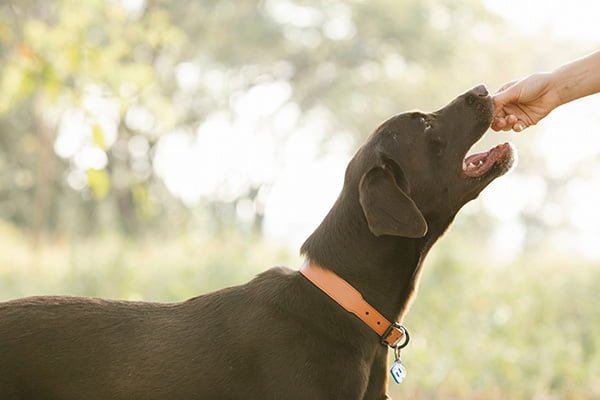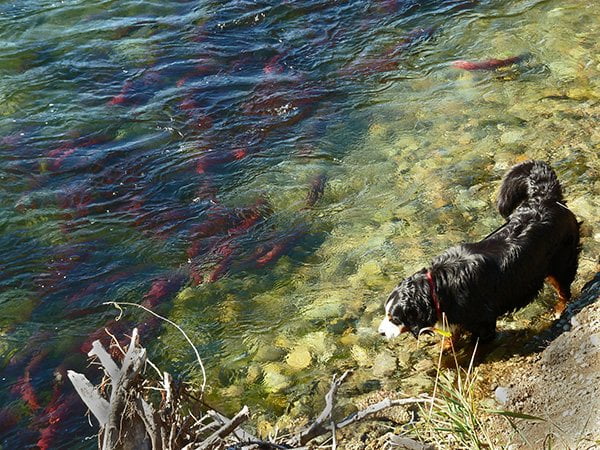We all know that a dog's diet should naturally contain plenty of meat. As pet owners, it's tempting to give them a bite of meat from time to time. With salmon being the second most popular seafood consumed in the United States, you may have already tried to offer some to your dog.
Salmon is incredibly healthy for humans, but are they good for dogs too? Is salmon safe for dogs? Can dogs eat cooked salmon? Can dogs eat raw salmon? Can dogs eat salmon skin and eggs?
Below, we'll tell you everything pet owners need to know about feeding salmon to dogs. If dogs should eat salmon at all, and what to look out for your dogs eat raw salmon.
Can Dogs Eat Salmon?
Yes, dogs can eat salmon - but only if it's been prepared in a specific way. In fact, some high-quality dog foods include salmon as an ingredient. Salmon has many nutritional benefits for dogs but can also potentially kill them if proper precautions are not taken.
Health Benefits Of Eating Salmon
First, let's discuss why you might want to feed your dog salmon. You might be familiar with the health benefits of salmon for humans, but what benefits can a dog's digestive system access?
Good Protein Source
Salmon is full of healthy proteins! A mere 3.5 ounces of salmon provides almost 20 grams of protein! Protein promotes muscle health and helps cells repair themselves.
Omega 3 Fatty Acids
Salmon is one of the best sources of omega-3 fatty acids. This nutrient helps your pup in many ways, including preventing arthritis, improving cognitive function, boosting the immune system, and promoting supple skin and glossy coats.
Vitamins
Salmon has high levels of vitamins A, B, and D. Vitamin A and D both boost the immune system and promote healthy skin, and the B vitamins help with metabolism and cell function.
Minerals
Minerals such as potassium, selenium, and zinc are found in salmon. These help with hormone production and metabolism, and wound healing.
Low Mercury Content
Most of these nutrients are found in many types of fish, but salmon is a great choice because it has lower mercury than other fish species.

Source: Pexels
The Downside Of Dogs Eating Salmon
Dogs naturally eat meat, and salmon has many benefits, so what's the problem?
Salmon Poisoning
It might seem odd to think that a dog could be harmed by eating raw meat, and most raw fish is indeed fine for dogs to eat! But raw salmon poses a unique problem for all canines. You can enjoy raw sushi, and other animals such as cats and bears can eat raw salmon without a problem, but dogs (and even wolves, actually!) struggle with a parasite that is commonly found in salmon. Nanophyetus salmincola is typically harmless, but dogs contain an organism called Neorickettsia helminthoeca in their digestive tract. The parasite from the raw salmon will infect this organism, and things spiral out of control from there.
The signs of salmon poisoning may take up to a week to be noticeable, depending on how fast these harmful parasites reproduce. Symptoms include:
- Diarrhea
- Vomiting
- Loss of appetite
- Rapid weight loss
- Lethargy
- Fever
- Swollen lymph nodes
- Dehydration
Salmon poisoning disease is serious, possibly leading to death if not treated promptly. Therefore, you should avoid feeding your dog raw or undercooked salmon. If your dog eats raw salmon or undercooked salmon and exhibits any of these symptoms, immediately take him to a veterinarian. Likely, your vet will use an antibiotic to kill the host organism and a dewormer to kill the salmon parasite.
High In Fat
Proteins and fats are necessary, and the proteins and fats found in salmon are particularly healthy, but a little goes a long way. If proper portion control is not practiced, a dog can easily overeat this popular fish, leading to weight gain.
How To Prepare Salmon For Dogs
Dogs can eat salmon as long as it has been properly prepared and cooked. If you are preparing salmon for your family and want to make a little extra for your dog, it's fine to grill, bake, poach, steam, or broil as long as it doesn't contain ingredients that can harm them. This includes butter, oil, sauce, spices, and seasoning that contains sugar, garlic, added salt, onion, nutmeg, pepper, and such.
Go with boneless salmon, as the small bones found in salmon can cause a choking hazard, particularly in small breeds. It is always best to double-check for bones before giving them to your dog. Fish bones are sharp and can sometimes pierce through intestinal linings or lodge in the stomach or intestine. Contact your veterinarian immediately if you suspect your dog has ingested fish bone.
When possible, source the best quality, wild-caught salmon for your dog. Wild salmon tend to have higher omega-3 and are less likely to contain the contaminants found in farmed salmon.
Salmon Oil For Dogs
Your dog can safely enjoy many benefits of salmon by taking salmon oil supplements that are designed for dogs. Unlike eating pieces of salmon, salmon oil contains a concentrated amount of omega-3 fatty acid.
Salmon oil typically comes in either liquid form that can be mixed into dog foods, soft gels that can be given orally, or chews that can be given as dog treats.
While liquid form is the purest form without any additives, it can be off-putting for some dogs and result in your dog not wanting to eat its dog food. If your dog doesn't like this option, try dog chews instead. Remember that liquid salmon oil can also smell and result in fishy dog breath. When shopping for liquid salmon oil, look for one that has a minimal smell.

Source: Pixabay
Frequently Asked Questions
Can Dogs Eat Smoked Salmon?
No, dogs should not eat smoked salmon. You should never feed your dog smoked salmon because curing salmon jerky in this way involves a large amount of salt, and this excessive sodium content is unsafe for dogs. Also, smoked salmon can still contain potential parasites that would lead to salmon poisoning.
Can Dogs Eat Canned Salmon?
Depending on how the salmon has been packaged, yes! Canned salmon is well cooked, and the cooking process has softened any bones found in it. Always use canned salmon that uses water to pack rather than brine or oil, and the brine and oil contain high levels of salt.
Can Dogs Eat Salmon Skin?
Yes, it is safe for your furry friend to eat salmon skin as long as it has been thoroughly cooked and has no other seasonings. The skin has a high-fat content, so feed salmon skin to your dog in small doses to prevent weight gain.
Can Dogs Eat Salmon Eggs?
If the salmon eggs have been processed into caviar, then yes. However, keep in mind that caviar is high in sodium and frequently has been seasoned. Only feed salmon eggs to your dog in small amounts.
Can Dogs Eat Dehydrated Salmon?
You can safely feed your dog dehydrated salmon even though it is not "cooked." During the dehydration process, moisture and bacteria are removed, making dehydrated salmon safe to eat. Dehydrated fish has all the health benefits of raw finish minus the mess.
Can Dogs Eat Freeze-Dried Salmon?
Freeze-dried salmon is safe for dogs to eat as the freeze-drying process starts with flash freezing in a vacuum chamber. Low-level heat is then applied to it to evaporate any ice crystals, removing about 98% of the moisture. Freeze-dried salmon still retains its vitamins, minerals, and fat content without any preservatives or additives, making it safe for dogs to consume.
Can Dogs Eat Salmon Sashimi?
No, dogs cannot eat salmon sashimi. Raw fish carry parasites that are harmful to your dog's health. Therefore, you cannot feed your dog sushi, crudo, poke, or tartare.
How Much Salmon Can Dogs Eat?
As with most foods, moderation is the key. Your dog's diet should mainly consist of dog food designed for dogs, as it contains all the nutrients to keep your dog healthy. You can give salmon as a treat once a week, but it should be a portion suitable to your dog's size. A dog can safely eat up to 100g of salmon for every 10 pounds of your dog's weight. If you are unsure how much salmon to give your dog, consult your veterinarian.
Is Salmon Food For Dogs With Food Allergies?
If your dog has food allergies or is sensitive to a protein like chicken or beef, dog food that includes salmon as a protein source may be a good solution. Salmon should never be the only source of protein in a dog's diet as it does not fulfill a dog's essential carbohydrate and vitamin needs. It is best to consult with your veterinarian if your dog has known food allergies or sensitivity.
